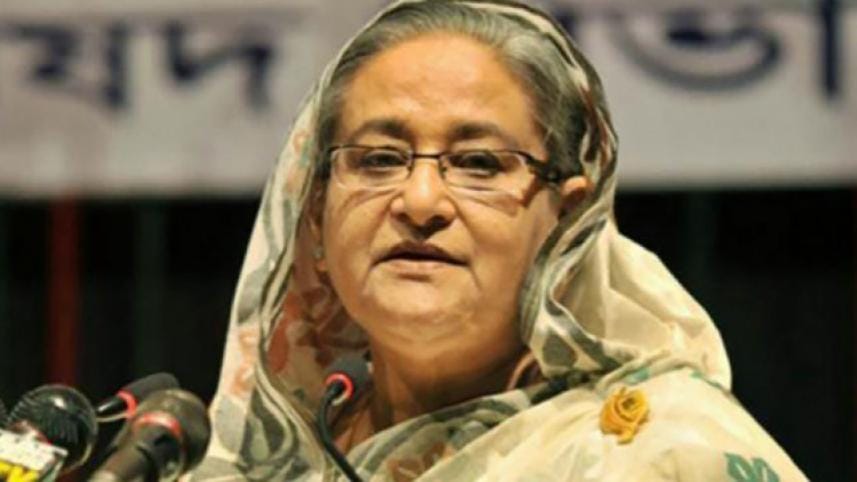Shun misperception to boost regional cooperation

Prime Minister Sheikh Hasina yesterday said the South Asian countries should eliminate “misperceptions and false apprehensions” to strengthen regional cooperation and development.
“In the past decades, we have seen many lofty regional ideas and initiatives. Some succeeded, others could not deliver,” she said, stressing the need for ensuring mutual trust between the South Asian nations.
The PM was addressing the closing plenary session of the two-day India Economic Summit of the World Economic Forum at Hotel Taj Palace in New Delhi, reports UNB.
Hasina suggested that four principles should be followed in the next decades, with much emphasis on managing geo-political realities through friendship and collaboration.
Talking about the first principle, she said, “We must strive to secure peace, stability and harmony, for every individual across our societies. We must move beyond the majority-minority mindset.”
The PM said pluralism has been a strength of South Asia for centuries. “So, we should be able to celebrate South Asia’s diversities in religion, ethnicity and language.”
Placing the second principle, she said, “We must ensure that inequality across societies do not widen in times of faster growth. Creation of wealth should be inclusive and must trickle down to the bottom millions. The less developed communities or countries should not lag behind. We must deliver to the aspirations and demands of our youths. We need to hold hands of ‘others’ across South Asia through our knowledge, experience, expertise, investments.”
About the third principle, she said mutual trust and mutual respect between all communities and countries is the key. “We need to get over misperceptions and false apprehensions.”
She said Bangladesh has consistently been contributing to international peace and security in global spheres, emanating from its policy of “Friendship to all, malice to none”, as laid out by Father of the Nation Bangabandhu Sheikh Mujibur Rahman. “This approach helped us maintain good relations with all countries.”
Inspired by the visionary ideas of Bangabandhu and driven by his belief in shared prosperity and responsibility, Bangladesh continues to champion regional cooperation like Bimstec, Saarc, BBIN and BCIM, the PM said.
Hasina mentioned that Bangladesh resolved sharing of the Ganges river water with India in 1996. “We amicably delimited our maritime boundary with India and Myanmar. Bangladesh and India are now developing trans-boundary river navigation. We are buying electricity from India through inter-country grid connections.”
Describing the fourth principle, the premier said, “We must manage our geo-political realities through friendship and collaboration. Let us appreciate and balance regional political realties for the interest of our peoples. We cannot trade off long-term interests for short-term gains.”
Replying to a query from the moderator of the event, Hasina said Bangladesh was attaching priority to establish connectivity among the South Asia, South East Asia and others to promote trade and commerce in the region.
She said Bangabandhu had realised the importance of enhancing connectivity for regional prosperity.
The PM said her government was working to restore the previous connectivity which was suspended after 1965. “We always think about it. We can make a bridge in this region and beyond.”
Hasina said Bangladesh was playing its role in establishing the Asian highway and Asian railway network.
Describing poverty as a common enemy, she said all countries in the region should work together to fight the menace.
Deputy Prime Minister of Singapore Heng Swee Keat, Managing Director of Sequoia Capital India Shailendra Singh, Executive Vice Chairperson of Apollo Hospital Enterprise Shobana Karmineni, Chairwoman of Booking.com Gillian Tans were panelists at the event.
‘INVEST IN BANGLADESH’
Speaking at India-Bangladesh Business Forum at New Delhi’s Hotel ITC Maurya, Hasina urged the Indian businessmen to step up investment in Bangladesh’s special economic zones and high-tech parks, reports BSS.
“A number of high-tech parks are also ready for technology and innovative enterprises. Bangladesh has offered three Special Economic Zones for Indian investors at Mongla, Bheramara and Mirsarai. Substantial investment from Indian investors in these three Indian Economic Zones in Bangladesh would help broaden our exportable base.”
She said Bangladesh is in the process of establishing 100 special economic zones.
The PM called upon the India-Bangladesh businessmen to work for mutual benefits. “I would urge all of you to make best use of the platform and contribute to the economies of both the countries for the greater mutual benefits of our peoples.”
Speaking about Bangladesh’s possibility of becoming an economic hub of the region, Hasina said the country’s strategic location provides tremendous potential for being the economic hub of the region. “With India to the west, China to the north and South-East Asia to the east, Bangladesh is in the middle of a combined market of 4 billion people.”
She said Bangladesh has the most liberal investment policy in South Asia that includes protection of foreign investment by law, generous tax holiday, concessionary duty on import of machinery, unrestricted exit policy, full repatriation of dividend and capital on exit.
On the rising trend of trade and investment between the two countries, the premier said the volume of bilateral trade has steadily grown over the past years. However, the balance of trade was still largely in India’s favour.
Indian Industry and Railway Minister Piyush Goyal, Bangladesh Commerce Minister Tipu Munshi, Federation of Bangladesh Chambers of Commerce and Industries President Sheikh Fazle Fahim, Confederation of Indian Industry President Vikram Shreekant Kirloskar, and Federation of Indian Chambers of Commerce and Industry (FICCI) President Sandip Somany also spoke on the occasion.



 For all latest news, follow The Daily Star's Google News channel.
For all latest news, follow The Daily Star's Google News channel.
Comments